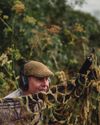If your ferret fails to reappear from the warren, do you bait and wait or start to dig? Simon Whitehead examines the options and their pros and cons.

To the uninitiated, ferreting appears relatively simple. In an idealistic world, the ferret goes down, all the rabbits bolt and the ferret returns happy as Larry. But if it were this simple, we would have no rabbits. It is the rabbit that decides whether or not it is going to bolt freely, run around its warren or find a dead end and sit it out. This internal monologue passes through every ferreter’s head at some time or another. It is at this point we face the conundrum of how to retrieve the errant ferret.
Why are we in a hurry to get our ferret back? This dilemma is as old as ferreting itself. For me, time is valuable and I see no profit in sitting on a ferret box for an hour, drinking tea, when I know I could excavate my ferret and crack on. To the sportsman it could be the end of a hard day’s sport — then what? Good ferrets are hard to come by and the last thing a keeper or poultry farmer wants is a loose ferret keen to kill.
Do we need such driven individuals? Of course we do. I wouldn’t have a ferret that ignores rabbits; I couldn’t afford to. We breed driven animals, release them under the ground, out of sight and out of reach. While falconers have telemetry and GPS systems linked to Google Maps, and those who work dogs use collars with the same capabilities, neither require the ability to pinpoint to a few square inches through clay, rock or sand.
Of course, not all ferrets work in the same way. Some stay, others flirt and some will come off; others choose to wander the pipes, but all have their place and all owe their well-being to their owners. I use a Deben MK3M ferret-finder, collar up all my ferrets and deal with what gets thrown at me, but I do appreciate that not everyone can or will use collars. But what are the alternatives?
This story is from the March 8,2017 edition of Shooting Times & Country.
Start your 7-day Magzter GOLD free trial to access thousands of curated premium stories, and 9,000+ magazines and newspapers.
Already a subscriber ? Sign In
This story is from the March 8,2017 edition of Shooting Times & Country.
Start your 7-day Magzter GOLD free trial to access thousands of curated premium stories, and 9,000+ magazines and newspapers.
Already a subscriber? Sign In

United we stand
Following United Utilities' decision to end grouse shooting on its land, Lindsay Waddell asks what will happen if we ignore our vital moors

Serious matters
An old gamebook prompts a contemplation on punt-gunning

They're not always as easy as they seem
While coneys of the furry variety don't pose a problem for Blue Zulu, he's left frustrated once again by bolting bunnies of the clay sort

Debutant gundogs
There's lots to think about when it comes to making the decision about when to introduce your dog to shooting

When the going gets rough
Al Gabriel returns to the West London Shooting School to brush up on his rough shooting technique

The Field Guide To British Deer - BDS 60th Anniversary Edition
In this excerpt from the 60th anniversary edition of the BDS's Field Guide To British Deer, Charles Smith-Jones considers the noise they make

A step too far?
Simon Garnham wonders whether a new dog, a new gun and two different fields in need of protection might have been asking too much for one afternoon's work

Two bucks before breakfast
A journey from old South London to rural Hertfordshire to stalk muntjac suggests that the two aren't as far detached as they might seem

Stalking Diary
Stalkers can be a sentimental bunch, and they often carry a huge attachment to their hill

Gamekeeper
Alan Edwards believes unique, private experiences can help keepers become more competent and passionate custodians of the countryside